Commemoration of the 50th anniversary of the end of the Vietnam War
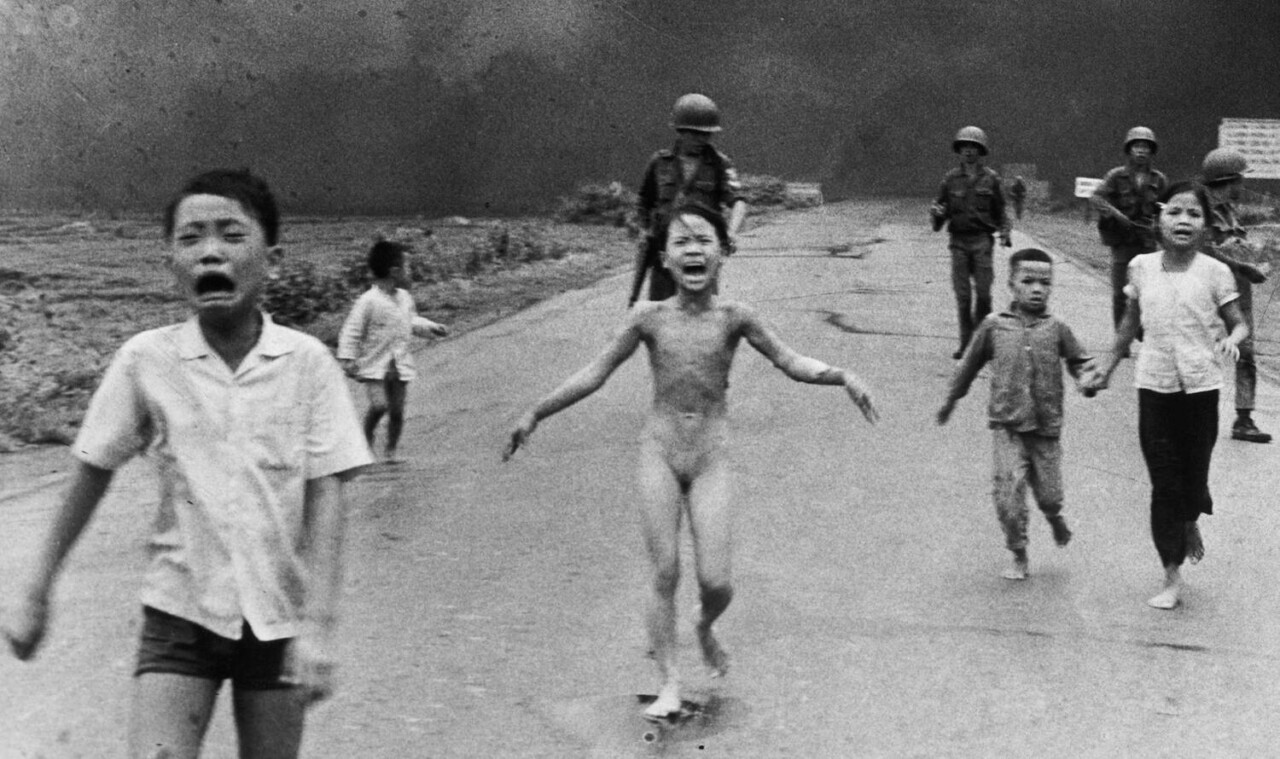
by Anh Lê
On April 30, we commemorated the 50-year anniversary of the end of the Vietnam War.
What lessons have we learned from the Vietnam War?
We must strive to learn the lessons from the Vietnam War.
During the war, my father, a former diplomat and professor, yearned for peace in his homeland of Vietnam. My mother had not seen her parents and siblings for decades because of the war. Our family prayed for the raining of bombs from B-52’s to cease and for peace to arrive in our native land.
When the war ended in 1975, who was the victor and who the vanquished?
Some immigrants within the Vietnamese American community argued vehemently over the loss of their country – “mat nuoc” (“loss of country”) – while the term “giai phong“ (“liberation”) was commonly used to mark the end of the war.
April 30 has also been referred to as “Ngay thong nhat” (“Day of reunification”), “Ngay Bac va Nam thong thuong” (“The day of the Vietnamese people in the North and South traveling freely in their reunified country”).
Today, most Vietnamese commemorate this day as “Ngay giai phong” (“Day of liberation”).
When the war ended, approximately 4 million Vietnamese were killed. Millions of Vietnamese were orphaned and widowed. Untold numbers of Cambodians and Laotians were killed. Over 58,000 Americans died.
The U.S. bombing in Vietnam was four times that of the U.S. and British bombing of Germany in World War II.
The U.S. government became involved in Vietnam in the 1950s and 1960S due to both a post-colonial period mentality and the pervasive Cold War mentality at that time.
After the Vietnamese defeated the French at Dien Bien Phu in 1954, the Geneva Accords of 1954 divided Vietnam into two regions, North and South. The Geneva Accords, crafted by superpowers, including the U.S., stated that this division would be temporary for two years , Vietnam would be reunified, and a national election held.
The U.S. government propped up the government of Ngo Dinh Diem in the South. Diem convinced the U.S. government that Ho Chi Minh, who had led the Vietnamese in defeating the French, was a Communist and would take over Vietnam. All Diem had to say was the word “Communist,” and he knew that the American government would react like a knee-jerk reflex.
The American people were misled by their government and Diem, indoctrinated that the U.S. must send economic and military aid to South Vietnam to defeat Communism, and fed the propaganda of the “domino theory”: “If South Vietnam falls to the ‘Commies,’ the entire region would collapse ‘’like dominoes.’”
When 1956 arrived, Diem did not allow for a national election and reunification. Diem knew that Ho Chi Minh would win the election.
President Lyndon Johnson deceived the American people with the 1964 Gulf of Tonkin Resolution, claiming that North Vietnamese boats had attacked an American Navy destroyer. Congress gave President Johnson unlimited power to expand the United States’ military involvement in the Vietnam War, without declaring war. Only two senators, Sen. Wayne Morse and Sen. Ernest Gruening, voted against the resolution. The Gulf of Tonkin Resolution passed by a vote of 88-2. The resolution’s claim was false, since there had been no attack by North Vietnamese boats. President Johnson had lied to the American people.
U.S. propped up puppet governments in South Vietnam
The American government propped up Ngo Dinh Diem and his family in South Vietnam. That was followed by a series of propped up puppet South Vietnamese governments, including Nguyen Cao Ky and Nguyen Van Thieu. These puppet governments, and the South Vietnamese generals and government officials that accompanied them, greatly profited from the war and wanted to keep it going to deepen their profits and amass more gold for themselves, all funded by hardworking American taxpayers.
Vietnam Quagmire
The Vietnam War continued to deepen and became known as the “Vietnam Quagmire.”
President Richard Nixon and National Security Advisor Henry Kissinger discussed dropping nuclear bombs over North Vietnam, according to U.S. archives.
Gen. William Westmoreland, who commanded U.S. troops in Vietnam, had commissioned a study in 1967 of the potential for use of nuclear weapons in Vietnam.
Westmoreland reportedly referred to Vietnamese people as “termites,” not human.
President Nixon said, “We should have flushed it (Vietnam) down the drain three years ago. These little brown people, so far away – we don’t know them very well.”
Gen. Curtis LeMay in 1965 threatened the North Vietnamese, “We’re going to bomb them into the Stone Age.”
An American major justified the bombings and near total destruction of the provincial city of Ben Tre by stating, “It became necessary to destroy the town to save it,” regardless of civilian casualties.
The destruction of entire villages and towns left a war ravaged landscape. The 1972 photo of the young Vietnamese girl, Phan Thi Kim Phúc, running naked along the country road in her village Tran Bang, her body burned with napalm, still sears our collective memories.
Noam Chomsky, a professor of linguistics at M.I.T., stated, “This war is simply an obscenity, a depraved act by weak and miserable men, including all of us who have allowed it to go on and on with endless fury and destruction.”
These men, including Robert McNamara, McGeorge Bundy, Dean Rusk – white men – came from privileged and elitist backgrounds and represented this country’s “aristocracy.” Their own sense of might and power, potency, virility, masculinity and manhood were defined by themselves through their acts of war that they perpetrated on the small country of Vietnam and the Vietnamese people.
It was also racism. The Vietnamese people were regarded as “less than human,” as “gooks,” as “dinks,” as “the enemy.”
These men’s own personal sense of impotence, their failure to defeat the Vietnamese people, even though they themselves unleashed the world’s most powerful armaments on Vietnam and the Vietnamese people, drove them even deeper into perpetrating the continued slaughter of Vietnamese human beings and committing more acts of war crimes against Vietnam and the Vietnamese people.
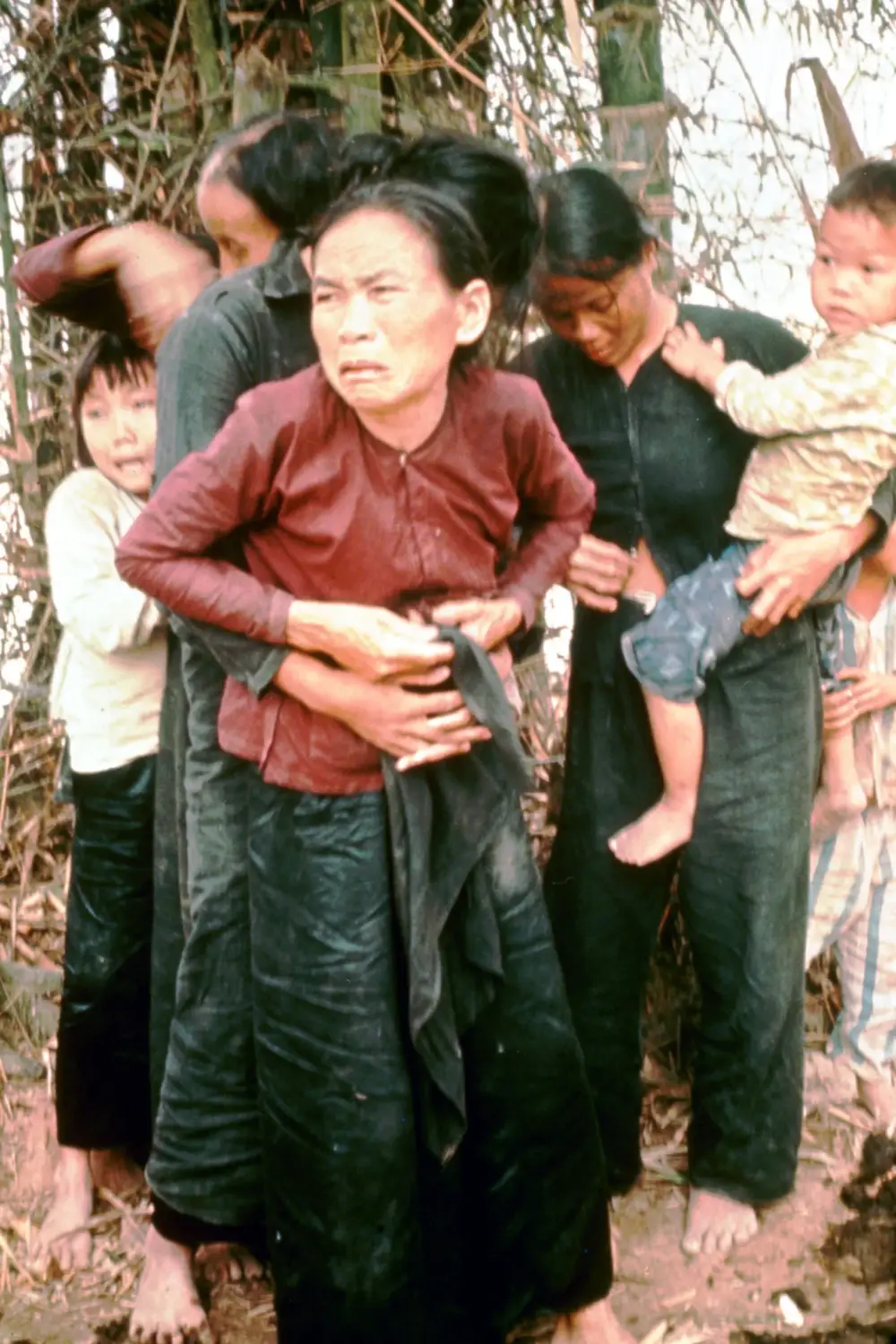
My Lai Massacre
On March 16, 1968, U.S. soldiers in Charlie Company committed the massacre of Vietnamese civilians in the hamlet of Mỹ Lai. The Mỹ Lai Massacre became known in Vietnamese as “Tham Sát Mỹ Lai.”
The massacre in Mỹ Lai occurred simultaneously with the massacres in the nearby village of Son My and the hamlet of My Khe.
In Mỹ Lai, over 567 Vietnamese civilians were killed. Over 400 civilians were killed in Son My, and over 90 civilians were killed in My Khe. Killed were babies, children, women and men of all ages.
The American soldiers murdered the Vietnamese civilians with automatic weapons, bayonets, and hand grenades. They burned down their huts and dwellings, killed their livestock, destroyed their stored food supplies, and poisoned their wells.
The American soldiers raped the Vietnamese women and girls, as young as 10 years of age. Women and girls were gang raped.
One elderly Vietnamese man was tossed down a well by an American soldier.
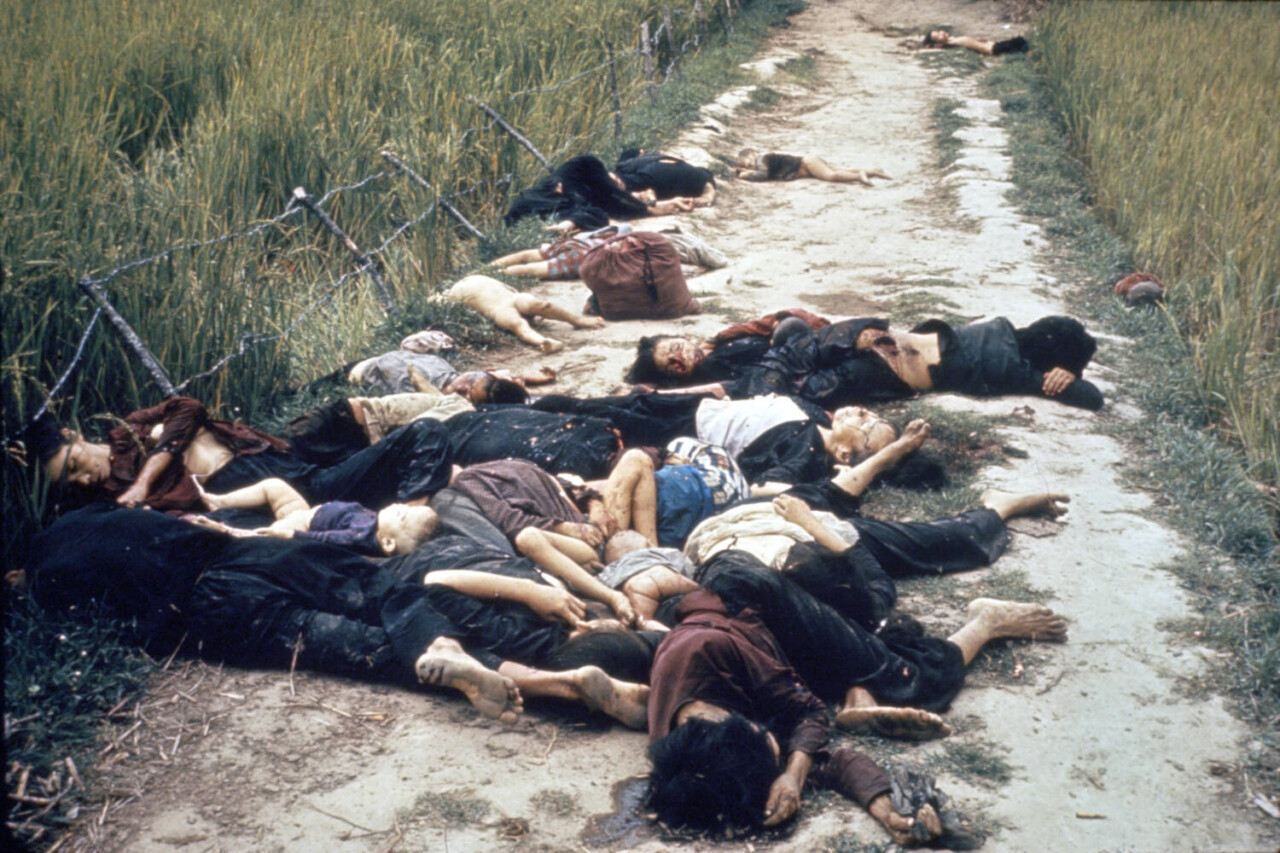
Seymour Hersh, an investigative reporter, wrote that a Vietnamese woman was raped after her children were killed. Hersh was awarded the Pulitzer Prize for his book on the Mỹ Lai Massacre.
Hersh and others have documented how the events of the Mỹ Lai Massacre and those who carried out the orders for the massacre, including Capt. Ernest Medina, Lt. William Calley and their chain of command higher ups in the U.S. Army, engaged in cover ups of the Mỹ Lai Massacre.
The Mỹ Lai Massacre – “Tham Sát Mỹ Lai” – was not an isolated incident during the Vietnam War. This war crime was not uncommon during the Vietnam War, according to U.S. veterans who returned from Vietnam.
Dr. Martin Luther King Jr.
Dr. Martin Luther King Jr. spoke out strongly against the war in Vietnam. Dr. King delivered his sermon, “Beyond Vietnam – A Time to Break Silence,” at the Riverside Church in New York City on April 4, 1967.
Dr. King condemned the U.S. war in Vietnam and its slaughter of Vietnamese children, women and men and called for the immediate halt to the U.S. bombings, a negotiated peace settlement and the end of the war.
Dr. King eloquently stated that, as a child of God and as a brother of the Vietnamese people, he could no longer remain silent while bearing witness to the slaughter of Vietnamese people. Dr. King stated, “A time comes when silence is betrayal.”
Dr. King declared, “This business of burning human beings with napalm, of filling our homes with orphans and widows, of injecting poisonous drugs of hate into veins of people normally human, of sending men home from dark and bloody battlefields physically handicapped and deranged, cannot be reconciled with wisdom, justice and love.”
Dr. King called the U.S. government “the greatest purveyor of violence in the world.”
Dr. King called on us, as a nation and as a people, saying, “A nation that continues year after year to spend more on military defense than on programs of social uplift is approaching spiritual death.”
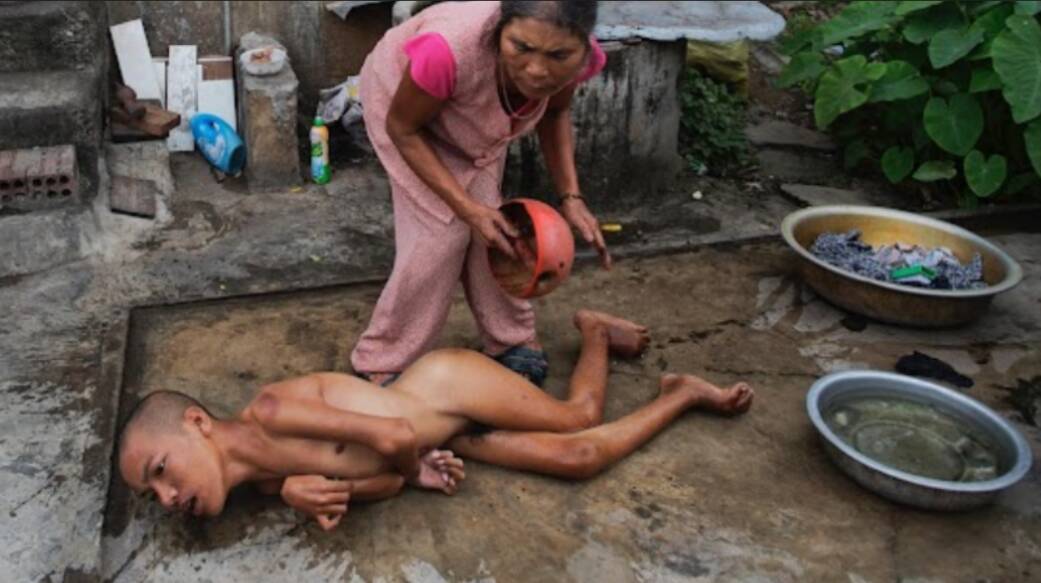
Agent Orange
The U.S. military sprayed Agent Orange, a defoliant herbicide mixture containing dioxin, the deadliest chemical known to humankind, over large parts of South Vietnam during 1961-1971. The Agent Orange destroyed food supplies and rendered the land barren.
The Agent Orange chemical warfare unleashed on the Vietnamese people and their land will be borne by the Vietnamese people for untold generations to come. Agent Orange contaminated the soils and waterways in many regions of southern Vietnam.
The spraying of Agent Orange has resulted in serious deformities, birth defects, cancers and deadly diseases for Vietnamese exposed to the herbicide and for their descendants.
Sen. Patrick Leahy (D-Vermont) led efforts to initiate a program to decontaminate the top soil of Agent Orange near the Bien Hoa airbase.
Sen. Leahy also initiated a program to purchase prosthetics for Vietnamese amputees.
Much work remains, however. Rep. Rashida Tlaib (D-Michigan) on April 28 introduced legislation to assist Vietnamese victims of Agent Orange carry out environmental remediation of Agent Orange at the “hotspots” and conduct health assessments and assist affected Vietnamese American communities. Rep. Tlaib also introduced the Victims of Agent Orange Act of 2025 to assist children of male U.S. veterans. Currently, only children of female U.S. veterans receive assistance. Rep. Tlaib’s legislation is co-sponsored by several other representatives in Congress and organizations working for peace and for reconciliation. Rep. Tlaib states, “It is time to meet our moral and legal obligations to heal the wounds inflicted by the atrocity (that was perpetrated in Vietnam).”
Sen. Eugene Mccarthy, Sen. George Mcgovern
Sen. Eugene McCarthy (D-Minnesota) and Sen. George McGovern (D-South Dakota) were among the senators who opposed the war in Vietnam. Paradoxically, both senators had voted for the 1964 Gulf of Tonkin Resolution.
Other senators who condemned the U.S. war in Vietnam included Sen. J. William Fulbright, Sen. Mark Hatfield, Sen. Frank Church and Sen. Wayne Morse.
Sen. McGovern, a highly decorated bomber pilot during World War II and an ordained Presbyterian minister who held a doctorate in history from Northwestern University” and ran for president against Richard Nixon in 1972, stated in 2011:
“I don’t know anybody alive today that thinks the war in Vietnam was a good investment for the U.S. It weakened us militarily, economically and morally. When we were carpet bombing a little country like Vietnam, we went against our moral principles.”
Belief in ‘American Exceptionalism’
Let us shed the false myth and the belief in “American exceptionalism.”
Christian G. Appy, a professor of American history at the University of Massachusetts, and one of the foremost historians on the Vietnam War, in his book, “American Reckoning: The Vietnam War and Our National Identity,” states:
“The Vietnam War and the history that followed exposed the myth of America’s persistent claim to unique power and virtue. Despite our awesome military, we are not invincible. Despite our vast wealth, we have gaping inequalities. Despite our professed desire for global peace and human rights, since World War II we have aggressively intervened with armed force far more than any nation on earth. Despite our claim to have the highest regard for human life, we have killed, wounded and uprooted many millions of people and unnecessarily sacrificed many of our own.
“Since the height of the Vietnam War, many Americans have challenged the idea that their nation has the right or capacity to assert global dominance. Yet there remains a profound disconnect between the ideals and priorities of the public and the reality of a permanent war machine that no one in power seems able or willing to challenge or constrain. That machine has been under construction for 75 years and has taken on a virtual life of its own, committed to its own survival and growth, unaccountable to the public, and protected by many layers of secrecy. It defends itself against anyone who seeks to curb its power. The tiny elite that makes U.S. foreign policy enhances and deploys the nation’s imperial power but has never fundamentally questioned or reduced it. Congress has consistently been bypassed or has itself abdicated its constitutional responsibility to play a decisive role in matters of war and peace. When it does act, it is mostly to rubber-stamp military spending and defer to executive branch authority. The persistence of warmongering in the corridors of power has systematically eroded the foundations of democratic will and governance. The institutions that sustain empire destroy democracy.
“But the public is not blameless. As long as we continue to be seduced by the myth of American exceptionalism, we will too easily acquiesce to the misuses of power, all too readily trust that our force is used only with the best intentions for the greatest good. Perhaps the only basis to begin real change is to seek the fuller reckoning of our role in the world that the Vietnam War so powerfully awakened – to confront the evidence of what we have done. It is our record. It is who we are.”
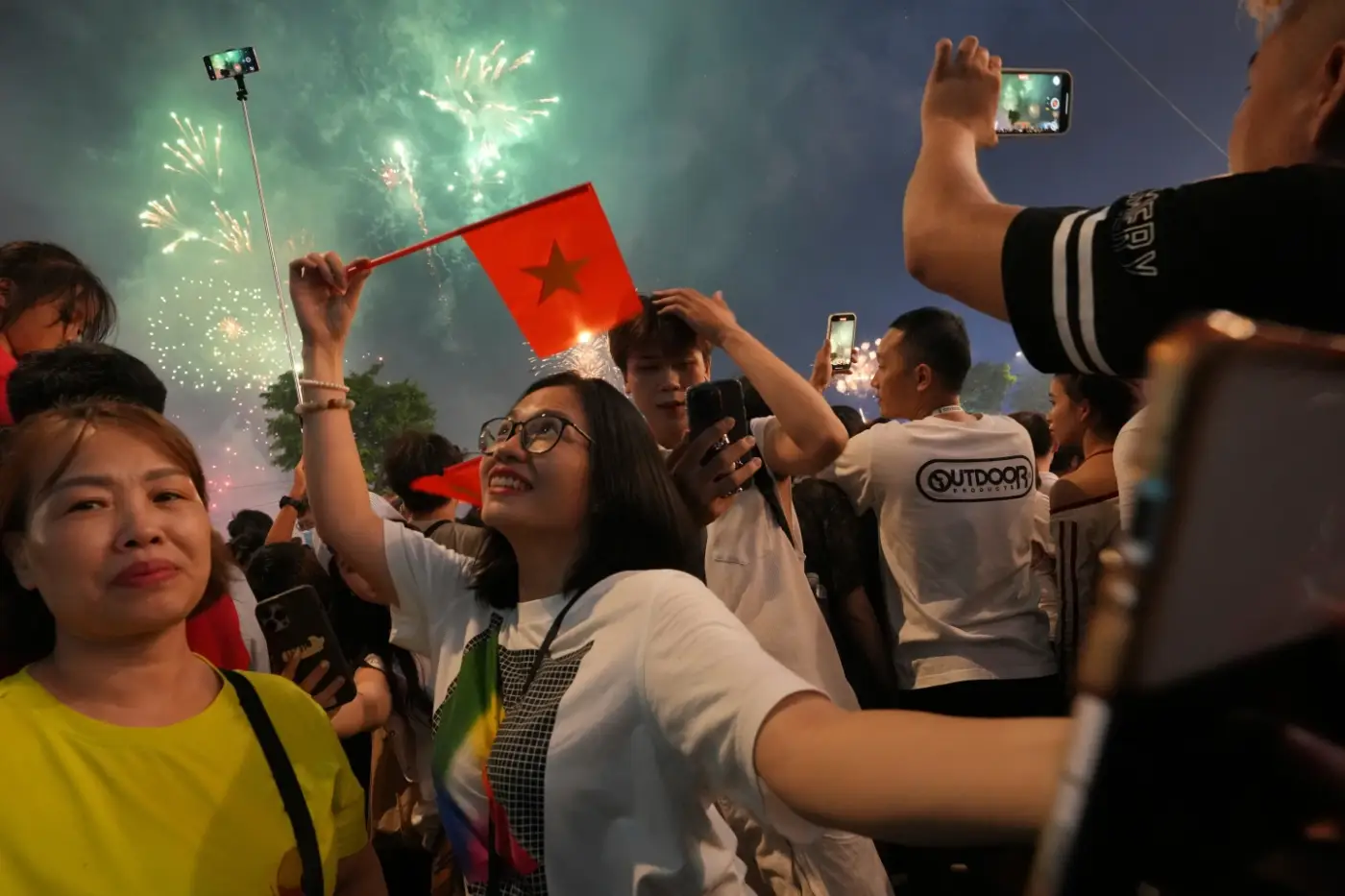
Vietnam at peace
As we celebrate and commemorate the 50-year anniversary of the end of the Vietnam War, Vietnam is at peace and enjoys the normalcy of a country free from war.
I honor the memory of all the Vietnamese children, women and men who perished in the Vietnam War.
I honor the memory of the babies, children, women and men who were massacred in the hamlet of My Lai and the nearby hamlets.
I honor the memory of the American soldiers who died in Vietnam.
I honor the memory of my uncle, Dr. Pham Vàn Can, who graduated at the top of his class at the School of Dentistry at the University of Saigon. My dearly beloved “Cau Can” (“Uncle Can”) was drafted into the South Vietnam Army, and was killed at a restaurant in Saigon when a bomb detonated there. His wife, “Cô Nhung,” was severely injured at the restaurant. Their young son, Dung, was orphaned. “Cau Can” never got to practice dentistry.
I honor the memory of my father and mother, who taught me and instilled in me the values of life and the belief in the sanctity of human life.
I honor the memory of my grandparents, uncles and aunt who endured through the war in Vietnam.
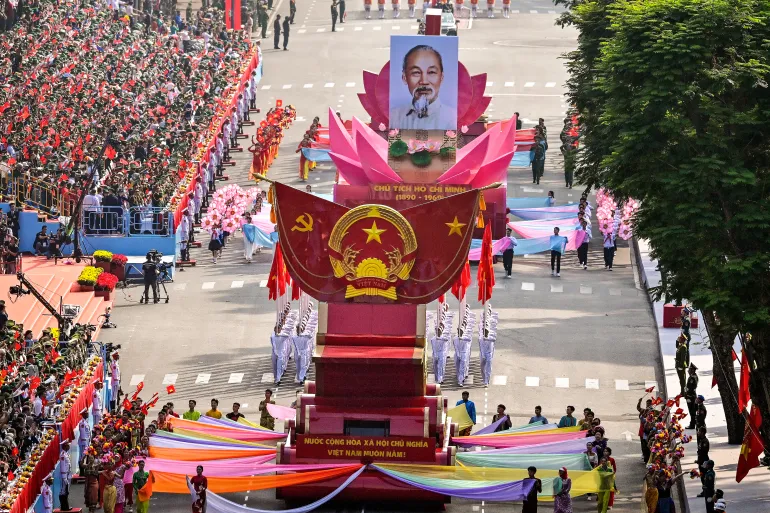
On April 30, 1975, “Ngay giai phong,” “Ngay thong nhat,” Vietnam prevailed.
Vietnam prevailed, even though it was a poor country.
Vietnam prevailed, even though it had no B-52 bombers, napalm, naval aircraft carriers and destroyers, and the other armaments the U.S. military possessed and unleashed on Vietnam.
Vietnam prevailed, even though it had to defend itself against the U.S. military and all of the U.S. military’s powerful armaments and weapons.
It is in the heart, mind and soul of Vietnam and the Vietnamese people to live as a free nation and as a free people.
Let us strive to work for a peaceful world for ourselves, for our children, for our grandchildren and for all future generations.
Let us reclaim our belief in the sanctity of human life, and turn swords into plowshares.
CHÚC VIETNAM HOA BINH MAÍ MÁI! MAY VIETNAM ENJOY LASTING PEACE!
Anh Lê is an independent journalist.
@ Copyright Anh Lê
The post Commemoration of the 50th anniversary of the end of the Vietnam War appeared first on San Francisco Bay View.
Source: https://sfbayview.com/2025/05/commemoration-of-the-50th-anniversary-of-the-end-of-the-vietnam-war/
Anyone can join.
Anyone can contribute.
Anyone can become informed about their world.
"United We Stand" Click Here To Create Your Personal Citizen Journalist Account Today, Be Sure To Invite Your Friends.
Before It’s News® is a community of individuals who report on what’s going on around them, from all around the world. Anyone can join. Anyone can contribute. Anyone can become informed about their world. "United We Stand" Click Here To Create Your Personal Citizen Journalist Account Today, Be Sure To Invite Your Friends.
LION'S MANE PRODUCT
Try Our Lion’s Mane WHOLE MIND Nootropic Blend 60 Capsules
Mushrooms are having a moment. One fabulous fungus in particular, lion’s mane, may help improve memory, depression and anxiety symptoms. They are also an excellent source of nutrients that show promise as a therapy for dementia, and other neurodegenerative diseases. If you’re living with anxiety or depression, you may be curious about all the therapy options out there — including the natural ones.Our Lion’s Mane WHOLE MIND Nootropic Blend has been formulated to utilize the potency of Lion’s mane but also include the benefits of four other Highly Beneficial Mushrooms. Synergistically, they work together to Build your health through improving cognitive function and immunity regardless of your age. Our Nootropic not only improves your Cognitive Function and Activates your Immune System, but it benefits growth of Essential Gut Flora, further enhancing your Vitality.
Our Formula includes: Lion’s Mane Mushrooms which Increase Brain Power through nerve growth, lessen anxiety, reduce depression, and improve concentration. Its an excellent adaptogen, promotes sleep and improves immunity. Shiitake Mushrooms which Fight cancer cells and infectious disease, boost the immune system, promotes brain function, and serves as a source of B vitamins. Maitake Mushrooms which regulate blood sugar levels of diabetics, reduce hypertension and boosts the immune system. Reishi Mushrooms which Fight inflammation, liver disease, fatigue, tumor growth and cancer. They Improve skin disorders and soothes digestive problems, stomach ulcers and leaky gut syndrome. Chaga Mushrooms which have anti-aging effects, boost immune function, improve stamina and athletic performance, even act as a natural aphrodisiac, fighting diabetes and improving liver function. Try Our Lion’s Mane WHOLE MIND Nootropic Blend 60 Capsules Today. Be 100% Satisfied or Receive a Full Money Back Guarantee. Order Yours Today by Following This Link.






